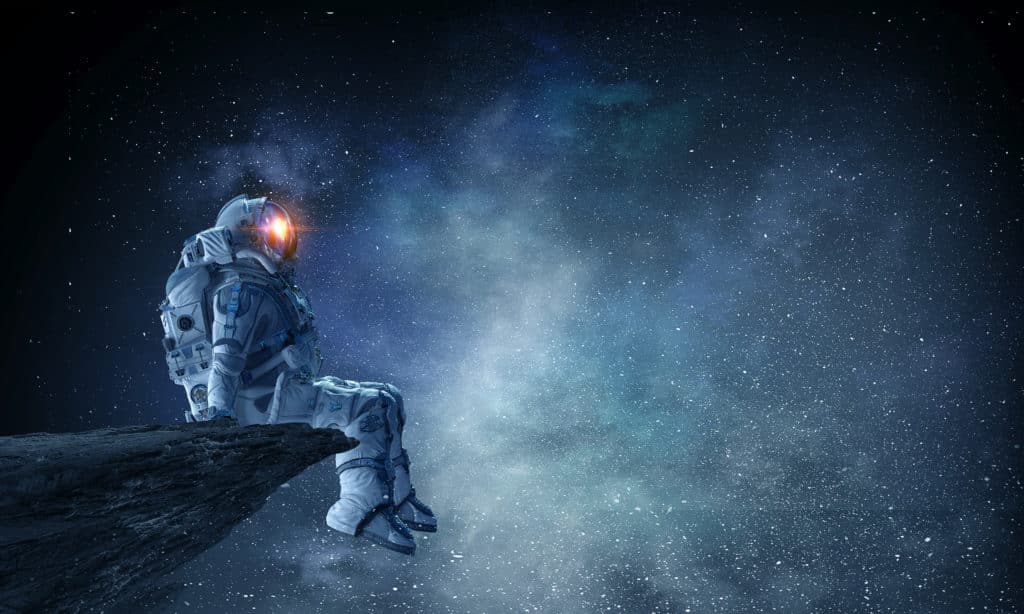Space is on a roll… at least if we are to believe how much interest shown the media have shown for Thomas Pesquet and the ‘space barons’ that Elon Musk, Jeff Bezos and Richard Branson have become. Perhaps this success is an opportunity to ask ourselves what the ethical rules of space exploration should be. Because, if the big players in the sector do not ask themselves these questions, they cannot ignore them if society has already made them.
Preserving celestial bodies
As a civilisation, we are becoming increasingly concerned – and not without reason – about the future of our planet. As such, is it reasonable to commit technical, scientific, and economic resources to the exploration of outer space? Rather than dreaming of distant worlds, imagining them as refuges for our species and thus risking forgetting our Earth, should we not concentrate on the latter, in order to care for it, preserve it and thus ensure our survival?
At the same time, we can question the way we conduct our exploration missions and their effects. Based on sixty years of experience, since the launch of Sputnik, COSPAR, the Committee on Space Research created in 1958, defined a set of rules and procedures to preserve locations where we place our probes and astromobiles. While we must first and foremost avoid contaminating the sites where we are looking for traces of extra-terrestrial life with terrestrial organisms, the aim is more generally to reduce the pollution and deterioration of these environments, which we still know only very imperfectly, to a minimum.
Certainly, the measures taken consist of very thorough sterilisation operations. But they also push for avoidance manoeuvres for vessels arriving at their destination, with the goal of preserving landing sites and celestial bodies. Similarly, we must be careful not to endanger life on Earth, and therefore ourselves, when we bring back samples from another planet. This concern, dating back to the time of Apollo missions to the Moon, will be very topical when we return samples from Mars in a few years’ time; something that has taken on a more threatening dimension with the current global pandemic.
COSPAR’s planetary protection measures constantly evolve, both on the planets to be explored and on Earth – as they do so they become more complicated. Beyond the framework of these very concrete protection measures, is the question of the right we have (or claim) to explore the universe, to transport or simply to transmit elements of our nature and products of our culture in space. So far, no rule or law exists on this subject… and we are probably not yet ready to make it the subject of a public debate!
Finally, without claiming to be exhaustive, it is appropriate to add a last question: that of the inevitable shift that will occur between the exploration phase and the exploitation phase. There is no lack of examples in the history of our species where the first phase (exploration) was interrupted or botched by a rush to start the second (exploitation). Even if they are often described as ‘colossal’ or ‘utopian’, Mars colonisation projects blooming on our screens and in the presentations of stakeholders in ‘New Space’ are no less worrying because they seem to dismiss or even ignore the scientific research that has yet to be carried out on the red planet.

For an ethics of space exploration
There is no doubt that these questions are part of the ethics of space, like similar approaches in all fields of human activity, in particular those concerning human beings and their environments. Space ethics concerns above all the players, whether they are “historical” (States, space agencies, research organisations) or “new”. Admittedly, few of these organisations and structures have established real ethical “procedures”: CNES, the French space agency, is currently the only agency to have an internal ethical expert (myself); UNESCO ended up dissolving the group that was interested in space activities within COMEST (the World Commission on the Ethics of Scientific Knowledge and Technology). However, academics who are beginning to take an interest in the ethics of space find its roots in the development of space law, as early as the middle of the 20th Century and even before the launch of the first Sputnik. It inspires and is inspired by the principles of free access to space, non-appropriation and cooperation based on the Space Treaty (1967) and the Moon Agreement (1979) drawn up by the United Nations.
It is in the light of this legal corpus that current issues such as the management of debris around the Earth and the envisaged appropriation of space resources by private companies must be addressed. Formally, space is not for sale: it is considered by law as a common good, like the sea, or even as a common heritage, as is the Antarctic. But who can police space effectively? Who will the guarantee the application of space law? And consequently the same doubt arises with regard to debris around the Earth: the absence of binding regulations and monitoring difficulties, mean that responsibility and management rest solely on the stakeholders and their goodwill. In view of the situation around the Earth, will this suffice?
One thing is clear: for humans, space has always been a screen onto which they have projected their dreams, their hopes and their fears, to the point of identifying it with the homes for their gods or with a promised paradise. And we continue to do so, for example, when we dream of a back-up planet, a ‘Planet B’. But space, over the past sixty years, has also become a mirror of our humanity; its activities, successes, and failures. We are developing highly advanced levels of cooperation, such as that which has enabled the construction and management of the international space station. We are also conducting competitions in which its technical nature does not conceal the issues of national sovereignty and economic domination. Why should we be surprised? Space is above all a human endeavour.
Exploration or the challenge of being human
Therefore, we should not expect to find solutions to our terrestrial and human problems in space: “Help yourself, and the sky will help you”, popular wisdom tells us, and not without reason. It would be foolish to pretend that we can do without space, given that in the space of a few decades our humanity has not only developed a dependence on it that is almost disturbing, but has also been shaped by its discovery and the beginning of its use.
Likewise, to claim to have ended its exploration would deny the very essence of our nature, of our human condition, which is based, in part, on curiosity, a thirst for knowledge, and our imagination. At the same time, we must be reasonable in our choices, making them according to our means and our needs, both individually and collectively. Space has finally provided us with shocking images of the singularity of our species. “Look at this little dot again. This is it. This is our home. That’s us,” Carl Sagan wrote as he contemplated an image of our planet taken from deep space. Today, this observation has all the makings of a challenge.









